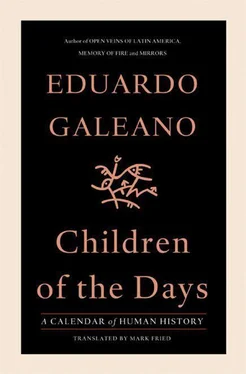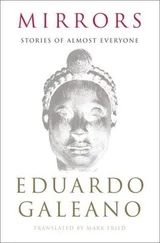“Suppose he never commits the crime?” said Alice.
— From Alice Through the Looking-Glass ,
sequel to Alice in Wonderland by Lewis Carroll, 1872
July 18. HISTORY IS A ROLL OF THE DICE
One hundred and twenty years it took to build the temple to the goddess Artemis in Ephesus, one of the wonders of the world.
In a single night in the year 356 BC it was reduced to ashes.
No one knows who built the temple. The name of its assassin, however, still resounds. Herostratus, the arsonist, wanted to go down in history. And he did.
July 19. THE FIRST TOURIST ON RIO’S BEACHES
Portuguese Prince-Regent João, son of Queen Maria, visited the beach at the port of Rio de Janeiro on his doctor’s advice in 1810.
The monarch jumped into the water with his shoes on, wearing a barrel. He was terrified of crabs and waves.
His audacious example did not catch on. The beaches of Rio were noxious garbage dumps, where at night slaves deposited the waste of their masters.
By the time the twentieth century rolled around, the waters offered a much better swim, but take note: ladies and gentlemen were kept well apart, as the rules of modesty required.
One had to dress up to go to the beach. On shores that today are a geography of nudity, the he’s went in covered to below the knees, and the pallid she’s swaddled head to foot for fear the sun would turn them into mulattas.
In 1950 a photograph published in Life magazine caused a stir in New York’s artistic circles.
The top painters of the city’s avant-garde appeared together for the first time: Mark Rothko, Jackson Pollock, Willem de Kooning and eleven other masters of abstract expressionism.
All men, except for an unknown woman in a black coat and a little hat, with a bag on her arm, standing in the back row.
The men could not hide their disgust at her outrageous presence.
One tried, in vain, to excuse the interloper. He praised her saying, “She paints like a man.”
Her name was Hedda Sterne.
July 21. THE OTHER ASTRONAUT
On this day in 1969, every newspaper in the world had the photo of the century on the front page: astronauts, lumbering like bears, had walked on the moon and left behind the first human footprints.
But the principal protagonist of the feat did not receive the congratulations he deserved.
Werner von Braun had designed and launched their spaceship.
Before taking up the conquest of space on behalf of the United States, von Braun had worked on Germany’s behalf for the conquest of Europe.
Engineer, officer of the SS, he was Hitler’s favorite scientist.
The day after the war ended, he used his smarts to make a prodigious leap and land on his feet on the other side of the sea.
He became an instant patriot of his new homeland, began worshipping at a Texas evangelical church and got busy in the space lab.
The astronauts weren’t the first.
Eighteen hundred years before, Lucian of Samosata visited the moon.
No one saw him, no one believed him, but he wrote about it in Greek.
Back around the year 150, Lucian and his sailors set off from the Pillars of Hercules, where the Strait of Gibraltar now lies, and a storm caught the ship, whirled it up into the sky and dumped it on the moon.
On the moon, no one died. The oldest of the old lunatics dissolved into thin air. They ate smoke and sweated milk. The rich ones wore glass clothing, the poor no clothing at all. The rich had many eyes and the poor, one or none.
In a mirror the lunatics watched all the terrestrial comings and goings. For the duration of their visit, Luciano and his sailors kept tabs on the daily news from Athens.
In 1944, in the tourist resort of Bretton Woods, it was confirmed that the twin brothers humanity needed were in gestation.
One was to be called International Monetary Fund and the other World Bank.
Like Romulus and Remus, the twins were nursed by a she-wolf until they took up residence in the city of Washington, cheek by jowl with the White House.
Ever since, these two govern the governments of the world. In countries where no one elected them, the twins impose obeisance as if it were destiny: they keep watch, they threaten, they punish, they quiz: “Have you behaved yourself? Have you done your homework?”
July 24. SINNERS BE DAMNED
In the Aramaic language spoken by Jesus and his apostles, the same word means both “debt” and “sin.”
Two millennia later, the debts of the poor merit the severest of punishments. Private property punishes those deprived of property.
July 25. RECIPE FOR SPREADING THE PLAGUE
In the fourteenth century fanatical custodians of the Catholic faith declared war on cats in Europe’s cities.
These diabolical animals, instruments of Satan, were crucified, skewered, skinned alive or chucked into bonfires.
Then the rats, liberated from their worst enemies, came to rule the cities. And the Black Death, transmitted by rats, killed thirty million Europeans.
July 26. IT’S RAINING CATS
On the big island of Borneo, cats used to eat the lizards that ate the cockroaches, and the cockroaches ate the wasps that ate the mosquitoes.
DDT was not on the menu.
In the middle of the twentieth century, the World Health Organization bombarded the island with massive doses of DDT to fight malaria, and they annihilated the mosquitoes and everything else.
When the rats found out that the cats had been poisoned, they invaded the island, devoured the fruit of the fields and spread typhus and other calamities.
Faced with the unforeseen rat attack, the experts of the World Health Organization convened a crisis committee and decided to parachute in cats.
Around this time in 1960, felines by the dozen descended from the skies over Borneo.
The cats landed softly, to the cheers of the humans who had survived the assistance of the international community.
July 27. THE LOCOMOTIVE FROM PRAGUE
Today in Helsinki, the 1952 Olympics came to an end.
Emil Zatopek, unbeatable long-distance runner, as strong and speedy as a locomotive, won three gold medals.
In his country he was declared a national hero and given the rank of colonel in the Czechoslovakian army.
Some years later, in 1968, Zatopek supported the popular uprising and opposed the Soviet invasion.
The colonel became a street sweeper.
In 1890, in a letter to his brother Theo, Vincent van Gogh wrote:
Let my paintings speak .
He killed himself the following day.
His paintings speak for him still.
July 29. WE WANT A DIFFERENT TIME
For three days in 1830, six thousand barricades turned the city of Paris into a battlefield and defeated all the king’s soldiers.
When this day became night, crowds used stones and bullets to smash the city’s clocks: the grand clocks of the churches and other temples of power.
July 30. INTERNATIONAL FRIENDSHIP DAY
As Carlos Fonseca Amador liked to say, a friend criticizes you to your face and praises you behind your back.
And as experience says, a real friend is a friend in all seasons. The others are just summertime friends.
In ancient times there was an uprising of things.
As the Mayas know, before the before, all the mistreated kitchen implements rebelled: burnt pans, chipped mortars, nicked knives, broken crockery. And the gods supported them in their rebellion.
Читать дальше












